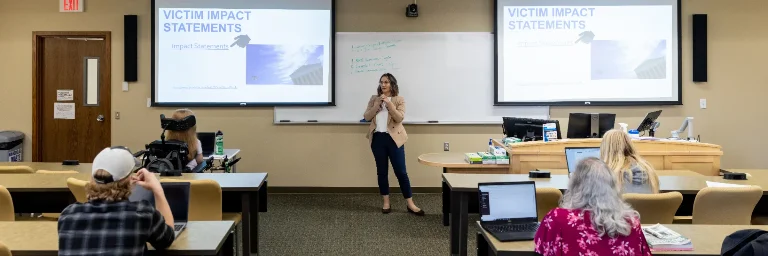
Criminal Justice vs. Criminology: Key Differences Explained
Crime is not caused by a single factor; it's a highly complex phenomenon influenced by various elements.
Request Information
It varies dramatically across cultures and historical periods. For instance, while alcohol consumption is legal in the USA for people 21 and over, it is completely banned in several Muslim countries. Crime also comes in varying degrees, from minor infractions like jaywalking to severe offenses like murder.
This complexity necessitates specialized fields dedicated to understanding and managing crime, such as criminal justice and criminology. Though these disciplines share some similarities, they are distinct in their approaches and focuses. Read on as we compare criminal justice vs. criminology, and see if any of the two is something you'd want to look more into.
What is Criminal Justice?
Criminal justice is an interdisciplinary field that examines the structure, function, and processes of institutions designed to respond to criminal behavior. It encompasses various components of the system, including law enforcement, the judiciary, and correctional facilities.
Criminal justice focuses on the practical aspects of managing and administering justice. This includes the procedures for investigating crimes, the protocols for arresting and prosecuting suspects, and the methods used in sentencing and rehabilitating offenders. Essentially, it is concerned with the operational mechanics of policing, courts, and corrections, aiming to maintain social order and ensure justice is served efficiently and fairly.
What is Criminology?
Criminology is a social and behavioral science dedicated to understanding the nature, extent, and causes of crime. Similar to psychology and sociology, it delves into human behavior, exploring the patterns and motivations behind criminal actions.
Criminologists study crime as a social phenomenon, analyzing how various personal, social, economic, and environmental factors contribute to criminal behavior. By examining these influences, professionals in the field aim to develop theories and frameworks that explain why crimes occur and who is likely to commit them. Their insights are critical in formulating effective policies and strategies to prevent crime and mitigate its impact on society. Through this comprehensive approach, criminology seeks to uncover the root causes of criminal behavior and inform the creation of more effective interventions and preventive measures.

Educational Pathways in Criminal Justice and Criminology
The field of criminal justice is diverse, offering a range of educational pathways depending on the specific career you aspire to. For instance, becoming a police officer in many states requires a high school diploma. From there, you can receive on-the-job training and gradually advance through the ranks to positions like detective and beyond.
Promotions in policing often require college degrees, which can also help make candidates more competitive in the job market. Additionally, roles in probation and parole typically require at least a bachelor's degree. Meanwhile, for roles such as a criminal justice instructor or professor, you'll need to pursue advanced degrees like a master's in criminal justice or a doctoral degree.
A career in criminology typically demands at least a master's degree in the field. Most professionals start with a bachelor's degree in criminology, psychology, or sociology and then advance to specialized criminology graduate degrees that prepare them for deeper analysis and research in criminology.
Typical Coursework
In criminal justice programs, students can expect to take courses related to criminal investigation, criminal law, and correctional alternatives, among many other topics. Moreover, these programs often provide opportunities to gain real-world experience through internships in areas like probation, law enforcement, victim advocacy, and legal settings, offering practical insights alongside theoretical knowledge.
For criminology, the curriculum often includes courses on criminological theory, social control (e.g., law and society), and other subjects that explore the social and psychological aspects of crime. These courses help students understand the complexities of criminal behavior and the societal reactions to it.
Skills Developed
There are many skills, especially soft ones, that criminal justice and criminology professionals have in common, including:
- The ability to analyze situations, identify problems, and develop effective solutions
- Adherence to ethical standards and integrity in handling sensitive information
- Effective communication skills, both verbal and written, and the ability to work well with others in various settings
However, in addition to these shared skills, the two fields also require unique skill sets tailored to their specific duties and responsibilities. For example, criminal justice professionals typically need:
- Proficiency in various investigation methods, including interviewing witnesses, suspects, and victims
- Skills in collecting, preserving, and documenting physical evidence to ensure its integrity in legal proceedings
- In-depth understanding of criminal statutes, legal precedents, and court procedures
- Expertise in conducting surveillance operations, both physical and electronic, to gather intelligence and monitor suspects
However, the exact skills needed often depend on the role they pursue. For example, in law enforcement, criminal justice professionals need to be proficient in handling firearms, self-defense techniques, and tactical operations. On the other hand, those working in forensic science may require a strong background in biology, chemistry, and analytical skills to process and interpret evidence accurately. Additionally, professionals in criminal rehabilitation must possess excellent communication and counseling skills to effectively work with offenders and support their reintegration into society.
Whereas criminology professionals are more focused on the following:
- Deep understanding of criminological theories and concepts that explain the causes and consequences of criminal behavior
- Skills in analyzing criminal behavior patterns and motivations to predict future actions and identify trends
- Expertise in creating, evaluating, and recommending policies aimed at crime prevention and criminal justice reform
- Skills in developing profiles of criminal suspects based on behavioral evidence and crime scene analysis
- Understanding the psychological and social impact of crime on victims and developing strategies to support and protect them
Career Prospects in Criminal Justice vs. Criminology
The need for professionals trained to maintain public safety and manage crime is perpetual, even in an ideal world without crime; we still need experts to ensure it stays that way. This ongoing necessity ensures a steady demand for professionals in both criminology and criminal justice fields.

Common Roles
There are many roles in the field of crime and justice that accept both criminology and criminal justice degrees, such as becoming a detective or an FBI agent. These positions often require advanced analytical skills and a deep understanding of criminal behavior, which can be obtained through either area. Additionally, some roles related to crime, like becoming a police officer, do not require more than a high school diploma to start. These positions typically offer on-the-job training and exciting opportunities for advancement into specialized areas with further education and experience, promising a bright future in the field.
Some common examples of careers in criminology and criminal justice include roles such as:
- Researcher
- Criminal profiler
- Victim advocate
- Parole or probation officer
- Mediator
- Police officer
- Criminal justice instructor or professor
- Lawyer (with the degree serving as a foundation for law school)
Which Field is Right for You: Criminal Justice or Criminology?
Being informed is the most crucial step when choosing between any career option. While this blog aims to provide a general understanding of criminology vs. criminal justice, it's always beneficial to delve deeper. Speaking to professionals currently working in these fields, attending informational interviews, and seeking mentorship can offer invaluable insights into the daily realities and long-term prospects of various roles.
When deciding which path to pursue, consider your career goals and what you hope to achieve. If you are driven by a desire to directly enforce laws, protect the community, and work on the front lines of public safety, criminal justice might be the right fit. Roles in this field include police officers, probation officers, and FBI agents, which often require a proactive, hands-on approach.
On the other hand, if you are more interested in understanding the psychological, sociological, and economic factors that contribute to criminal behavior and you enjoy research and data analysis, criminology might be more suitable. Careers such as criminal investigators, researchers, and criminal profilers focus on analyzing crime trends and developing preventative measures.
Furthermore, consider your comfort level with various work environments. Criminal justice careers often involve high-stress situations and direct interactions with offenders and victims, requiring strong interpersonal skills and resilience. Criminology careers are typically more research-oriented, involving extensive data analysis and theoretical work, which may be better suited to those who prefer a more controlled environment.
Ultimately, your personal interests and passion should guide your decision. Reflect on whether you are more intrigued by the practical application of laws and the workings of the legal system or if you are fascinated by the underlying causes of crime and enjoy deep analytical work.
Additionally, think about your long-term career stability and financial goals. By thoroughly evaluating these factors, you can confidently choose a career that is both fulfilling and suited to your unique strengths and goals.
Conclusion
All in all, the difference between criminal justice and criminology lies in their focus, with one applying the law and the other analyzing the causes of crime, yet both fields are essential in maintaining public safety and security. We all benefit greatly from the dedication and expertise of professionals in both areas.
UND offers various programs to help train individuals to join the ranks of those fighting crime every day, whether through law enforcement, research, or policy development. Explore the B.S. in Criminal Justice or the accelerated option if you aim to advance to more specialized roles quickly. Embrace the opportunity to be a hero in your community, protecting and serving to make a difference in the world.
FAQs
No, criminology focuses on studying the causes and patterns of criminal behavior, while criminal justice involves the application and enforcement of laws and the legal system.
The FBI is not exclusively criminal justice or criminology but rather an agency where individuals with degrees in either field can pursue specific roles.
Both! The program encompasses both criminology and criminal justice, reflecting different orientations within the same field of study.
A degree in criminology or criminal justice provides a broad understanding of crime, criminal behavior, and the justice system, often involving theoretical and research-based coursework. In contrast, a police academy focuses on the basic training required for law enforcement officers, which may include some practical skills but is primarily intended to prepare recruits for entry-level positions in policing.
While criminology and criminal justice degrees provide foundational knowledge relevant to law, they are not the same as law school. Law school prepares students for a variety of careers focused on legal theory, case law, and the practice of law. On the other hand, criminology and criminal justice programs cover a wider range of topics related to crime, justice, and the legal system.